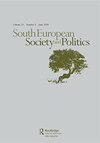没有供给的需求?纾困后葡萄牙的民粹主义态度和投票行为
IF 4.6
1区 社会学
Q1 POLITICAL SCIENCE
引用次数: 16
摘要
与其他欧洲国家不同,葡萄牙缺乏相关的民粹主义政党,尽管其最近严重的经济危机背景本可以为民粹主义政党的出现提供肥沃的土壤。为了阐明这一明显的矛盾,我们着眼于等式的需求方,利用调查数据来检查葡萄牙民粹主义态度的传播、相关性和潜在的选举影响。我们表明,虽然具有民粹主义观点的个人并不具有特定的社会经济特征,但一些态度因素是个人层面民粹主义的重要预测因素。此外,那些民粹主义态度更强烈的人不太可能在选举中弃权,而是倾向于投票给那些在言论中表现出某种程度民粹主义的政党。本文章由计算机程序翻译,如有差异,请以英文原文为准。
Demand without Supply? Populist Attitudes and Voting Behaviour in Post-Bailout Portugal
ABSTRACT Unlike other European nations, Portugal has experienced an absence of relevant populist parties, even if its recent background of severe economic crisis could have been a fertile ground for their advent. To illuminate this apparent contradiction, we look at the demand side of the equation, drawing on survey data to examine the spread, correlates, and potential electoral implications of populist attitudes in Portugal. We show that while individuals with a populist outlook do not share a particular socioeconomic profile, several attitudinal factors are significant predictors of individual-level populism. Furthermore, those with stronger populist attitudes are not more likely to abstain in elections, but rather tend to vote for parties that exhibit some degree of populism in their rhetoric.
求助全文
通过发布文献求助,成功后即可免费获取论文全文。
去求助
来源期刊

South European Society and Politics
Multiple-
CiteScore
5.80
自引率
21.20%
发文量
14
期刊介绍:
A leading point of reference for scholars of Southern Europe, South European Society and Politics promotes both comparative and inter-disciplinary analyses, as well as offering innovative single county and sub-national studies. The journal acts as a forum for social, economic, cultural, contemporary historical and political approaches to research on the region, and is particularly keen to sponsor policy–focused studies in all these disciplines. The journal publishes research articles; South European Atlas with election reports and articles on other subjects of topical interest, and an extensive book reviews section, including both review articles and individual book reviews.
 求助内容:
求助内容: 应助结果提醒方式:
应助结果提醒方式:


